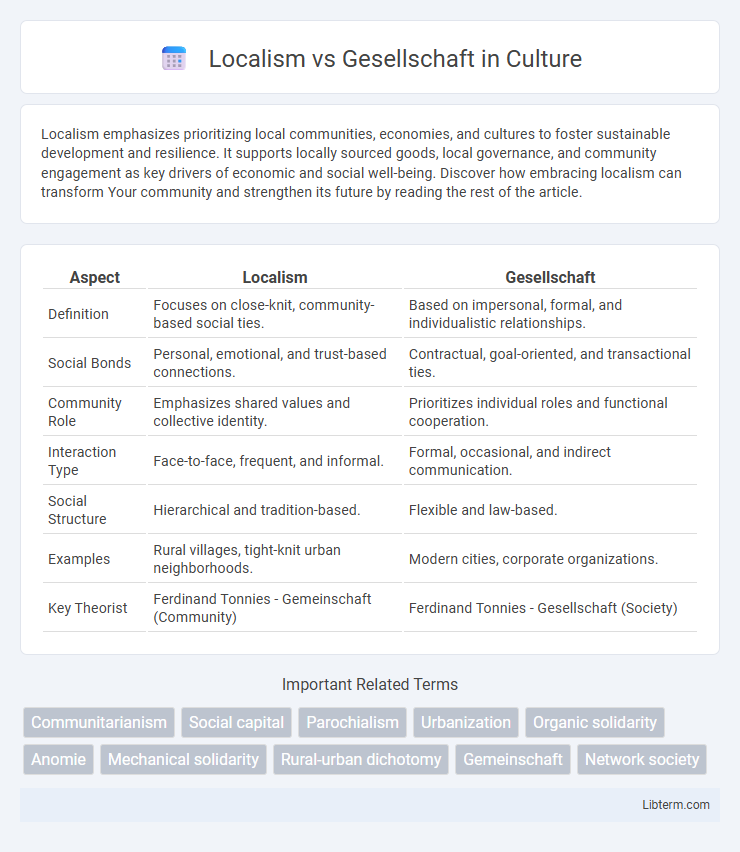Localism emphasizes prioritizing local communities, economies, and cultures to foster sustainable development and resilience. It supports locally sourced goods, local governance, and community engagement as key drivers of economic and social well-being. Discover how embracing localism can transform Your community and strengthen its future by reading the rest of the article.
Table of Comparison
| Aspect | Localism | Gesellschaft |
|---|---|---|
| Definition | Focuses on close-knit, community-based social ties. | Based on impersonal, formal, and individualistic relationships. |
| Social Bonds | Personal, emotional, and trust-based connections. | Contractual, goal-oriented, and transactional ties. |
| Community Role | Emphasizes shared values and collective identity. | Prioritizes individual roles and functional cooperation. |
| Interaction Type | Face-to-face, frequent, and informal. | Formal, occasional, and indirect communication. |
| Social Structure | Hierarchical and tradition-based. | Flexible and law-based. |
| Examples | Rural villages, tight-knit urban neighborhoods. | Modern cities, corporate organizations. |
| Key Theorist | Ferdinand Tonnies - Gemeinschaft (Community) | Ferdinand Tonnies - Gesellschaft (Society) |
Understanding Localism: Core Principles and Values
Localism centers on prioritizing local communities, emphasizing self-reliance, direct participation, and preserving cultural identity within small-scale social structures. It values strong interpersonal relationships, localized decision-making, and a sense of belonging that fosters social cohesion and mutual support. Core principles include decentralization of power, environmental stewardship, and economic practices that benefit the immediate community, contrasting with the impersonal, large-scale, and bureaucratic nature of Gesellschaft societies.
The Concept of Gesellschaft: Origins and Definitions
The concept of Gesellschaft originates from German sociologist Ferdinand Tonnies, defining a type of social relationship characterized by impersonal, formal, and individualistic interactions typically found in modern urban societies. Gesellschaft emphasizes contractual ties, self-interest, and rationality, contrasting with Gemeinschaft, which reflects close-knit, community-oriented bonds. This framework helps analyze social structures in industrialized societies, highlighting the shift from traditional communal living to more anonymous and bureaucratic social arrangements.
Historical Context: Localism and Gesellschaft Through Time
Localism emerged prominently in pre-industrial societies where tightly knit community bonds and face-to-face interactions defined social life, fostering strong collective identities and shared customs. Gesellschaft evolved alongside industrialization and urbanization, characterized by impersonal relationships, individual goals, and formal institutions that facilitated complex economic and social exchanges. Historical shifts from agrarian to industrial economies transformed localist, kin-based communities into Gesellschaft-type social structures dominated by market-driven interactions and bureaucratic organization.
Community Bonds: Localism’s Emphasis on Social Relationships
Localism prioritizes strong, face-to-face social relationships that create tightly-knit communities with shared values and mutual support, fostering trust and cooperation. In contrast, Gesellschaft societies are characterized by impersonal, contractual bonds driven by individual interests and formal institutions. The emphasis on community bonds in localism enhances social cohesion and collective identity, which are often weaker in Gesellschaft structures.
Urbanization and the Rise of Gesellschaft Society
Urbanization accelerates the shift from Localism, characterized by close-knit, community-based interactions, to Gesellschaft societies defined by impersonal, formal relationships rooted in individualism and economic efficiency. The rise of Gesellschaft correlates with industrialization, population density growth, and complex urban infrastructures that necessitate specialized roles and bureaucratic organization. This transformation reshapes social bonds, emphasizing contractual associations over traditional, communal ties found in Localism.
Economic Structures: Small-Scale vs Large-Scale Organizations
Localism emphasizes small-scale economic structures rooted in community-based enterprises that foster direct relationships and localized resource management. Gesellschaft favors large-scale organizations characterized by complex divisions of labor, standardized processes, and impersonal contractual relations. The economic contrast highlights localism's reliance on personalized, flexible economies versus gesellschaft's systemic, industrialized frameworks driving modern capitalist markets.
Governance: Decision-Making in Localism vs Gesellschaft
Localism prioritizes decentralized governance, emphasizing community-based decision-making where local stakeholders have direct influence over policies affecting their area. Gesellschaft governance operates through structured, formal institutions with hierarchical decision-making processes, often prioritizing efficiency and uniformity across larger populations. The contrast lies in Localism's participatory approach fostering localized autonomy versus Gesellschaft's reliance on standardized, bureaucratic governance frameworks.
Cultural Identity: Traditions, Diversity, and Social Cohesion
Localism strengthens cultural identity by preserving unique traditions and promoting community-specific diversity, fostering a deep sense of belonging. Gesellschaft societies emphasize individualism and social contracts, often leading to broader but less intimate cultural cohesion. Balancing local customs with societal integration enhances social cohesion by respecting diversity while maintaining shared values.
The Impact of Technology on Localism and Gesellschaft
Technology has significantly transformed the dynamics between Localism and Gesellschaft by enhancing connectivity and enabling large-scale social organization beyond traditional local boundaries. Digital platforms and communication tools have facilitated Gesellschaft's complex, impersonal social structures while simultaneously empowering local communities through localized information sharing and grassroots mobilization. This dual impact reshapes social cohesion, balancing global interdependence with the preservation of unique local identities.
Future Perspectives: Balancing Localism with Global Gesellschaft
Future perspectives emphasize integrating the strong community bonds of localism with the expansive networks of Gesellschaft to foster sustainable social development. Innovations in digital technology enable local cultures to engage globally without losing their unique identities, creating hybrid social structures that leverage both proximity and connectivity. This balance supports resilience, economic diversity, and cultural exchange, addressing challenges of globalization while preserving local autonomy.
Localism Infographic

 libterm.com
libterm.com